
You’re always looking for new topic ideas for articles and blog posts.
But sometimes, you might find it difficult to come up with subjects that will resonate with your readers.
You want to stay on topic but find a different angle or a related issue. Most of all, you want to find something interesting to write about and quickly.
Here are some quick and easy ways to help you find new ideas for your writing.
How to research topic ideas for articles
If you publish articles, you need new topics all the time.
Yes, you can do a Google search or try Google Trends. But what if you don’t have a keyword or subject in mind?
You could try scanning through emails or social media sites like Twitter, Reddit, or Quora.
When you don’t know what to write about, you can waste a lot of time forcing an idea to surface.
Yes, there are premium tools for keyword research, but they are usually very expensive and out of the price range for most bloggers.
Like you, I’m always looking for new content ideas to publish.
But I have found far better ways to research and uncover new topics related to my blog’s subject.
Best of all, they are free, quick, and consistently produce good results.
Here are the approaches I use to find topic ideas for articles in a hurry. You probably use a few of these already, but hopefully, there are some new ones you can try.
So, let’s look at the ten methods I use for topic discovery.
1. Search engine site: search operator
This is my number one way because I don’t need to have a keyword or topic in mind.
You only need to find a few sites posting content related to your blog’s subject. For me, it’s sites related to writing, publishing, and books.
Use the search operator, site: followed by a site’s URL. It should look like this. site:example.com
Just make sure there is no space after the colon.
Here’s a sample screenshot of the result for my site.
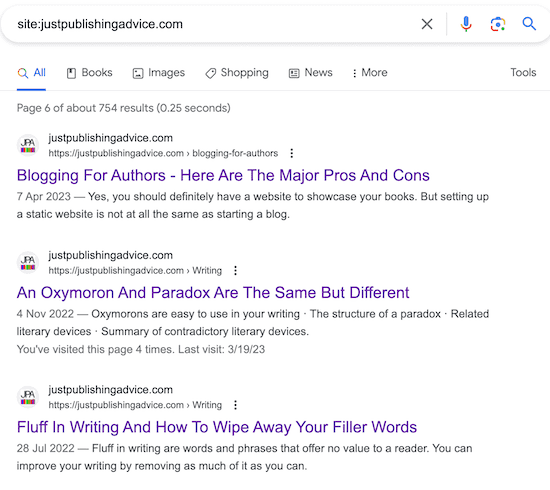
Now you can skim through a site’s content and look for new ideas.
With site: search, the number of results can vary from day to day. But you will find almost all the content on any site, so you can scan through all of it.
Look at the titles, and you’ll find plenty of new ideas to write about.
Now, you’re not going to copy or steal the content. The titles alone are more than enough to give you plenty of new topics and keywords you haven’t written about.
2. People also ask
When you have a topic or keyword phrase in mind, this is a great Google search tool for finding questions.
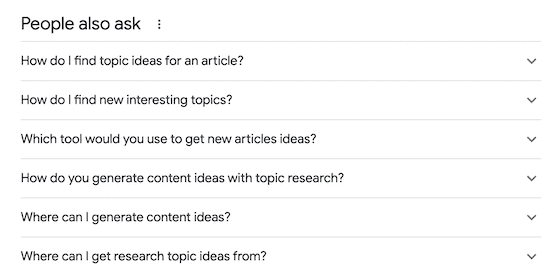
One little trick is to click on the arrow on the last question, which will expand the widget to show more questions.
3. Topic + alphabet search
When I have a broad topic in mind, this hack works well in uncovering lots of related topics.
Here’s an example using the term electric bicycles.
All you do is add a letter of the alphabet to your search term.

You will get a new list with every letter that you use.
From the list above, perhaps an electric bicycle conversion kit would be an idea to use.
4. Related searches
It’s not always the most productive, but you can sometimes find useful terms.
Scroll to the bottom of the first page on Google search to find it.

Occasionally there are some terms that can be worthwhile.
5. Your blog comments
Comments on your blog are a mine of ideas.
I always scan through them, looking for questions people have asked me.
Sometimes a new comment will give me an instant idea.
It’s one of the best resources for finding topics you haven’t covered yet.
6. Answer The Public
Neil Patel has a few SEO tools, such as Ubersugget.
But he also offers Answer The Public, a free tool for topic ideas.
There is a premium version, but the free version gives you plenty of data to investigate.
You get lots of lists or wheels like this with different question forms.
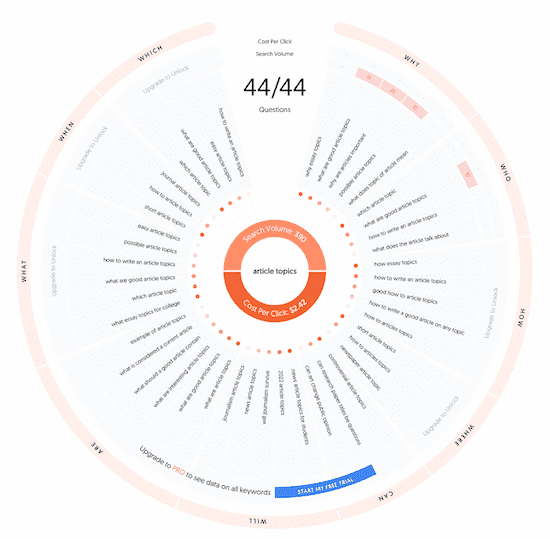
It’s a pretty helpful free resource for content writers.
7. ChatGPT
I have to say that I do not advocate using AI for writing.
However, tools like ChatGPT are useful for research.
Here’s an example prompt with the results.
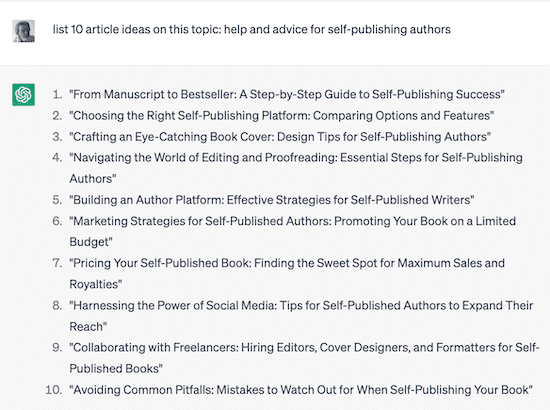
One little tip is that you can get more suggestions by clicking “Regenerate Response.”
Another tool you can use is Bing Chat to find writing ideas.
8. Image Search
Google image search doesn’t seem like a practical way of finding writing ideas and topics.
But there is a use that you might not have noticed.
It’s the slider at the top of many search results

There is often an arrow on the right to give you many more topics.
It’s a quick and easy way to find a new slant on topics on your site.
9. Search Console
When I’m stuck for ideas, I always find some quick wins with Google Search Console.
The best way is to select one of your top-ranking pages and then click on queries.
Look through the list for search terms that you didn’t use in your content, and then at the position.
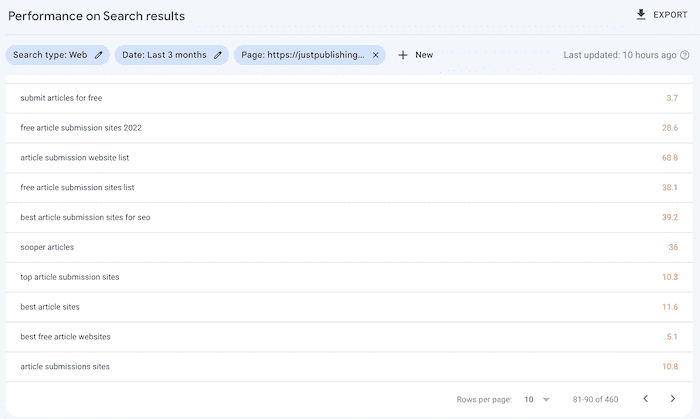
Very often, queries with a low position are generated by Google and are not within your content.
These are ideal candidates for new content.
In the list above, the term: best article submission sites for SEO, is not in my content but has a query position of around 40.
When you find ones like this, it’s a clue that it could be a good term to use in a new piece of content.
10. What did I learn?
I don’t know how many articles I have written about something new I learned how to do.
But it’s a guaranteed new how-to article anytime you learn how to do or improve on something.
It doesn’t matter what topic you write about; there will always be opportunities to let your readers know about a new or better way to do things.
Change is happening all the time and rapidly now.
So there’s plenty of scope for you to add great topic ideas for your articles.
Conclusion
When you need to write new content, finding a topic is sometimes the hardest part of publishing articles.
But it doesn’t need to be a long-winded or time-wasting chore.
With the ten ideas in this article, you will find it much easier and faster to build a list of new topics.
I have to say that using the site: operator is my go-to tool when I’m topic-hunting.
Generally, it takes me less than 30 minutes to find a handful of great new ideas.
But the other methods I use are also productive, quick, and easy. So take your choice.
Related Reading: 10 Popular Types Of Articles That People Like To Read
Share This Article


